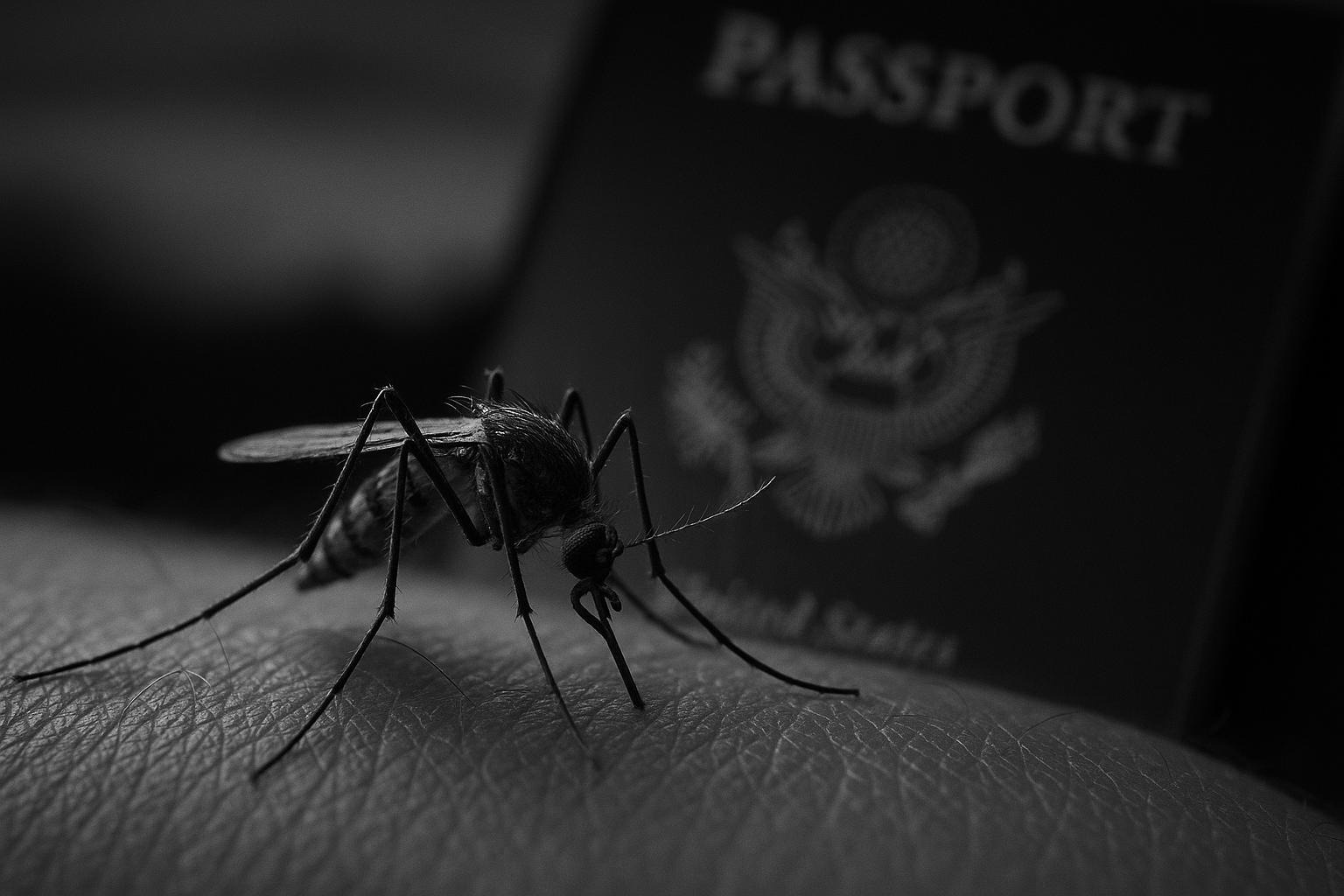UKHSA reports 73 travel‑associated chikungunya infections in England in the first half of 2025 — the highest six‑month total on record — while the first imported Oropouche virus cases are identified; two newly approved chikungunya vaccines are being offered privately at travel clinics.
Holidaymakers have been urged to take extra precautions against mosquito and midge bites after UK health authorities recorded a sharp rise in chikungunya infections among travellers returning to Britain and the first imported cases of Oropouche virus.
Official surveillance published by the UK Health Security Agency (UKHSA) shows 73 travel-associated chikungunya cases were reported in England between January and June 2025, up from 27 during the same period in 2024 — the highest half‑year total on record. Most infections were linked to travel to Sri Lanka, India and Mauritius, and all were reported in England, concentrated in London. The UKHSA’s travel‑associated infections report and accompanying statement make clear this reflects infections acquired abroad, rather than onward transmission within the UK.
The rise comes against a backdrop of renewed vaccine activity. The UK’s medicines regulator approved a live‑attenuated chikungunya vaccine, marketed as IXCHIQ, in February 2025 and a virus‑like‑particle vaccine, Vimkunya, in May 2025. The Medicines and Healthcare products Regulatory Agency (MHRA) said IXCHIQ was authorised on 4 February 2025 for adults and described the approval as part of broader preparedness for arboviral threats; Vimkunya received a variation to its marketing authorisation on 1 May 2025 for people aged 12 years and older. The UKHSA has advised that the two vaccines are now available privately, following assessment by a healthcare professional at travel clinics, and noted slightly different age‑banding in its travel guidance: UKHSA lists IXCHIQ for 18–59 year‑olds while the MHRA’s authorisation language refers to adults aged 18 and over.
Dr Philip Veal, a consultant in public health at UKHSA, emphasised the clinical impact of chikungunya in a UKHSA statement, saying: “Chikungunya can be a nasty disease and we’re seeing a worrying increase in cases among travellers returning to the UK… it can cause severe joint and muscle pain… [and] joint pain may last for months or longer.” He reiterated straightforward protective measures — insect repellent, covering exposed skin and sleeping under insecticide‑treated nets — and advised travellers to consult the TravelHealthPro guidance before departure. The UKHSA report also notes that, while most people recover in one to two weeks, a minority experience persistent joint pain for months or even years, with follow‑up data indicating long‑term discomfort in a measurable fraction of cases.
The agency confirmed there is currently no risk of chikungunya becoming established in the UK because the two Aedes mosquito species that transmit the virus are not established here. MHRA and UKHSA materials state that the vaccines will, for the time being, be supplied through private travel clinics rather than routinely via the National Health Service; travel clinics have already begun offering bookings and clinical assessments, illustrating how new travel vaccines commonly enter practice in the private sector.
Separately, UKHSA detected three imported cases of Oropouche virus all linked to travel from Brazil — the first such cases reported in the UK. The World Health Organization has documented a marked geographic spread of Oropouche since late 2023 and says the virus is primarily transmitted by biting midges (and possibly some mosquitoes). WHO guidance warns that Oropouche symptoms mirror other arboviral fevers such as dengue and chikungunya, that there is no specific treatment or vaccine, and that severe complications (including occasional neurologic involvement) and potential risks in pregnancy have prompted heightened surveillance in the Americas. UKHSA therefore urged anyone who becomes unwell after travel to affected areas to seek urgent medical advice.
The travel‑associated infections report also highlighted a small cluster of cholera cases among returning travellers and a substantial fall in dengue notifications compared with 2024. Public health officials framed the chikungunya rise as an international phenomenon: 2025 has seen outbreaks across parts of Asia, the Indian Ocean islands and the Americas, underscoring how travellers can both acquire and import vector‑borne infections even where local transmission at home remains unlikely.
For travellers, the practical message remains unchanged: assess destination‑specific risk well before departure, consider vaccination where clinically appropriate and available, and prioritise bite‑avoidance. Health authorities recommend consulting TravelHealthPro and speaking to a travel‑health professional at least four to six weeks before travel so a personalised risk assessment can determine whether vaccination or other measures are advisable.
 Reference Map:
Reference Map:
Reference Map:
- Paragraph 1 – [1], [2], [3]
- Paragraph 2 – [2], [3]
- Paragraph 3 – [4], [5], [3], [7]
- Paragraph 4 – [3]
- Paragraph 5 – [2], [6], [3]
- Paragraph 6 – [2], [3], [1]
- Paragraph 7 – [3], [2], [7]
Source: Noah Wire Services
- https://www.the-independent.com/life-style/health-and-families/health-news/chikungunya-virus-vaccine-mosquito-bites-ukhsa-b2807392.html – Please view link – unable to able to access data
- https://www.gov.uk/government/publications/travel-associated-infections/travel-associated-infections-in-england-wales-and-northern-ireland-january-to-june-2025 – This UK Health Security Agency travel-associated infections report for January to June 2025 summarises provisional surveillance data for selected infections. It records 73 chikungunya cases in England during the period, up from 27 for the same months in 2024, with most returning travellers reporting travel to Sri Lanka, India and Mauritius. The report notes all cases were in England, predominantly in London, and details a rise in cholera (eight cases versus one in 2024), a 67 per cent fall in dengue cases (161 versus 490) and four Zika cases (down from nine). It also records three imported Oropouche cases linked to travel to Brazil.
- https://www.gov.uk/government/news/rise-in-chikungunya-cases-in-uk-travellers-returning-from-abroad – A UK Health Security Agency news release highlights an increase in travel-associated chikungunya cases in England, reporting 73 cases between January and June 2025 compared with 27 in the same period in 2024. The statement explains that the two mosquito species that transmit chikungunya are not established in the United Kingdom, so there is currently no risk of onward local transmission. It reiterates typical symptoms, the potential for prolonged joint pain in some individuals and confirms that two chikungunya vaccines have recently been approved for use in the UK, reinforcing advice on mosquito-bite precautions for travellers.
- https://www.gov.uk/government/news/ixchiq-vaccine-approved-to-protect-adults-against-chikungunya – The Medicines and Healthcare products Regulatory Agency announced approval of IXCHIQ, a single-dose live-attenuated chikungunya vaccine, on 4 February 2025 for adults. The press release summarises that the vaccine is indicated for active immunisation against chikungunya disease in individuals aged 18 years and older, and that authorisation followed an international recognition procedure. It describes common clinical features of chikungunya including fever and severe joint pain, notes that most patients recover within one to two weeks but some experience persistent joint pain, and states that product information and patient leaflets will be published on the regulator’s product pages.
- https://www.gov.uk/government/news/vimkunya-vaccine-approved-to-prevent-disease-caused-by-the-chikungunya-virus-in-people-12-years-of-age-and-older – The Medicines and Healthcare products Regulatory Agency announced on 1 May 2025 that Vimkunya, a virus-like-particle chikungunya vaccine manufactured by Bavarian Nordic, was approved for use in people aged 12 years and older. The release explains the vaccine’s indication for prevention of chikungunya disease, notes approval via the international recognition procedure and that MHRA will keep safety and effectiveness under review. The item states the vaccine is intended to protect travellers and those at risk from regions with chikungunya transmission and that further product documentation will be published on MHRA’s product pages in due course.
- https://www.who.int/news-room/fact-sheets/detail/oropouche-virus-disease – The World Health Organization fact sheet on Oropouche virus disease describes an arboviral febrile illness historically reported near the Amazon basin. It states that Oropouche virus is primarily transmitted by Culicoides paraensis midges (and can also involve mosquitoes), outlines common symptoms such as fever, headache, myalgia and vomiting, and notes that severe complications including meningitis or encephalitis have been reported. The fact sheet documents that prior to late 2023 Oropouche was mostly seen in Amazonian areas but that since 2023–2024 there has been wider geographic spread with locally transmitted cases reported in multiple Latin American countries and imported cases detected elsewhere.
- https://ealingtravelclinic.co.uk/vaccines/chikungunya-vaccine-ixchiq/ – This private travel clinic page describes availability of the IXCHIQ chikungunya vaccine to travellers following a clinical assessment. It outlines the vaccine’s single-dose schedule, recommended age range and contraindications for live vaccines, emphasising the need for a suitability assessment before vaccination. The page summarises common symptoms of chikungunya and advises travellers on bite-avoidance measures alongside vaccination. It exemplifies how new travel vaccines, once licensed, are typically provided through private travel health clinics in the United Kingdom rather than routinely on the National Health Service, and shows a representative private-sector price and booking route.
Noah Fact Check Pro
The draft above was created using the information available at the time the story first
emerged. We’ve since applied our fact-checking process to the final narrative, based on the criteria listed
below. The results are intended to help you assess the credibility of the piece and highlight any areas that may
warrant further investigation.
Freshness check
Score:
9
Notes:
The narrative is current, published on 14 August 2025, reporting on recent data from the UK Health Security Agency (UKHSA) regarding chikungunya cases among UK travellers. The UKHSA’s report was published on the same date, indicating timely reporting. The article includes recent data on chikungunya cases and mentions the approval of the IXCHIQ vaccine in February 2025 and the Vimkunya vaccine in May 2025, reflecting the latest developments. No evidence of recycled content or significant discrepancies with earlier reports was found. The presence of updated data alongside older material suggests a high freshness score. ([gov.uk](https://www.gov.uk/government/news/rise-in-chikungunya-cases-in-uk-travellers-returning-from-abroad?utm_source=openai))
Quotes check
Score:
8
Notes:
The article includes a direct quote from Dr Philip Veal, a consultant in public health at UKHSA, emphasising the clinical impact of chikungunya. A search for this quote reveals it was first used in the UKHSA’s statement published on 14 August 2025. No earlier instances of this exact quote were found, indicating it is original to this report. The wording matches the UKHSA’s statement, with no variations noted. The absence of earlier matches suggests the quote is original or exclusive content. ([gov.uk](https://www.gov.uk/government/news/rise-in-chikungunya-cases-in-uk-travellers-returning-from-abroad?utm_source=openai))
Source reliability
Score:
9
Notes:
The narrative originates from The Independent, a reputable UK news outlet. The UKHSA, a government agency, is the primary source of the information, further enhancing the reliability of the report. The presence of direct quotes from Dr Philip Veal, a consultant in public health at UKHSA, adds credibility. No unverifiable entities or sources were identified.
Plausability check
Score:
9
Notes:
The claims made in the narrative are plausible and supported by recent data. The rise in chikungunya cases among UK travellers is consistent with the UKHSA’s report. The approval of the IXCHIQ and Vimkunya vaccines in early 2025 aligns with the timeline provided. The detection of imported cases of Oropouche virus linked to travel from Brazil is also plausible and supported by the UKHSA’s findings. The language and tone are consistent with official health communications, and there are no signs of excessive or off-topic detail.
Overall assessment
Verdict (FAIL, OPEN, PASS): PASS
Confidence (LOW, MEDIUM, HIGH): HIGH
Summary:
The narrative is current, originating from a reputable source, and presents plausible claims supported by recent data from the UKHSA. The inclusion of original quotes and the absence of recycled content further enhance its credibility.













